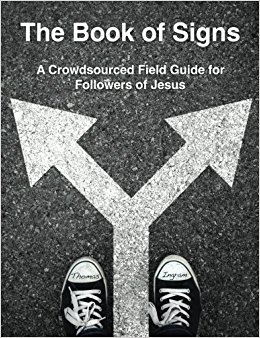The Book of Signs:
A Crowdsourced Field Guide for Followers of Jesus
by Thomas E. Ingram
–Review by Teri Hyrkas
If you need a midwinter pick-me-up book to read, The Book of Signs: A Crowdsourced Field Guide for Followers of Jesus (2016, Linen Press) by Thomas E. Ingram is a terrific choice. An uplifting, generous, Christ-centered volume, The Book of Signs will refresh your love for Jesus while reanimating your thinking about the Christian walk in the twenty-first century.
In The Book of Signs, Ingram has taken the ancient skill of tracking the journey of an individual — in this case Jesus — and has spliced it with a modern skill called crowdsourcing. The helpful and healthful information brought together by these two skill sets is presented for the reader in what is called a “field guide,” Ingram’s Book of Signs.
We learn from Ingram that in the art of tracking, searchers must be familiar with the characteristics and trappings of the one being tracked in order to find the object of interest. What happens, then, if the information related to the subject has become distorted, contaminated or lost? How can a seeker find what, or more correctly for Ingram’s purposes, who, we are looking for? This is the central question in The Book of Signs. Ingram’s concern is directed toward Jesus’ followers. Christians, says Ingram, should be the clearest evidence that Jesus is alive and well on planet Earth. What characteristics, what description of Christ and Christian living should we be looking for today in order to identify Christ as he lives in his followers, and as they follow the path of Christ?
To answer these questions Ingram used a method of information gathering known as crowdsourcing. “In the simplest of definitions,” writes Ingram, “crowdsourcing is a process in which a crowd (a group of self-selected individuals) works together to find a solution to a problem. While a variety of factors contribute to effective crowdsourcing, one of the primary contributors to its ability to uncover innovative solutions seems to be attributable to the advantages associated with diversity in these problem solving groups.”
Ingram sketches out for the reader how an internet based crowdsourcing platform works, then offers information about the dependability, usefulness and appropriateness of using crowdsourcing as a means to help solve difficult challenges facing the Church. Having laid this foundation, Ingram reprints the invitation that announced and welcomed people to participate in the theological crowdsourcing experiment via social media:
“Christianity is a body clothed in words. However, our garb has become garbled and our apparel is no longer apparent. Christianity seems lost for words because it is lost in words.… What are the words that bridge the centuries, the words that chime on every page of church history? What are the most beautiful words in the Christian vocabulary? What are the words by which we live, the words over which we wrangle –our trigger words?… What are the 100 words that make us Christian?”
Throughout a period of four months, hundreds of people responded to this invitation for words, and the “100 words that make us Christian” were chosen. Writes Ingram, “The contributions were thoughtful, insightful and inspirational. It is from this fertile soil The Book of Signs was birthed.”
Of the 100 words that appear in the book many were familiar and expected, several entries were surprising, others brought a smile; but all of them were treated to a stimulating commentary by Ingram. Here is a portion of Ingram’s reflection on the word, “Inhabit”:
” As Christians, we participate in this give and take of our habitations with one very unique distinction. We not only inhabit, but we are inhabited. An invited guest has taken up residence within us and inhabits that residence.
‘The mystery in a nutshell is just this: Christ is in you.’ (Col 1:27 Msg.)
“As the one who inhabits us, Jesus influences us. Everything we do, think, feel, and say comes under the influence of the one who inhabits us. We could say; Christians are under the influence…the influence of Christ who lives within us. In turn, when followers of Jesus inhabit a place or a culture, we exert a Jesus influence upon that culture, as everything around us comes under the influence of the one who inhabits our being…under the influence of Jesus.”
The Book of Signs: A Crowdsourced Field Guide for Followers of Jesus by Thomas Ingram is a wonderfully joyful book – a genuine “triple alleluia” volume which would, by its very structure, be a perfect choice for devotional reading. It would also make a marvelous gift. In addition, if you go to the author’s website, http://www.thomaseingram.com/publication.html, you can listen to three soundscapes titled forest, ocean, and rain, designed to serve as a soundtrack while you read the reflections. I hope you will choose to read The Book Of Signs. I also hope you will consider giving a copy to another person; your gift of The Book of Signs just might help someone to come “under the influence” of Jesus.

